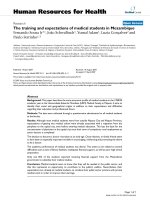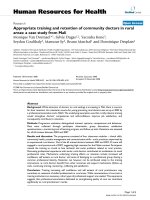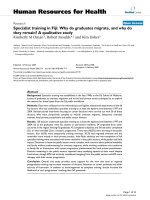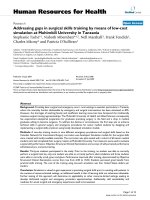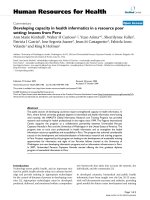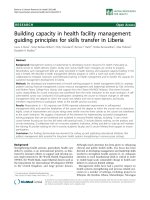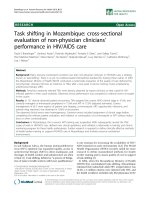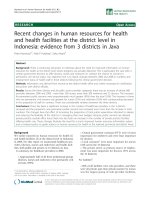báo cáo sinh học:" Specialist training in Fiji: Why do graduates migrate, and why do they remain? A qualitative study" potx
Bạn đang xem bản rút gọn của tài liệu. Xem và tải ngay bản đầy đủ của tài liệu tại đây (286.24 KB, 10 trang )
BioMed Central
Page 1 of 10
(page number not for citation purposes)
Human Resources for Health
Open Access
Research
Specialist training in Fiji: Why do graduates migrate, and why do
they remain? A qualitative study
Kimberly M Oman
1
, Robert Moulds*
2
and Kim Usher
3
Address:
1
James Cook University School of Medicine and Dentistry, Townsville, Queensland, Australia,
2
Fiji School of Medicine, Suva, Fiji and
3
James Cook University School of Nursing, Midwifery and Nutrition, Townsville, Queensland, Australia
Email: Kimberly M Oman - ; Robert Moulds* - ; Kim Usher -
* Corresponding author
Abstract
Background: Specialist training was established in the late 1990s at the Fiji School of Medicine.
Losses of graduates to overseas migration and to the local private sector prompted us to explore
the reasons for these losses from the Fiji public workforce.
Methods: Data were collected on the whereabouts and highest educational attainments of the 66
Fiji doctors who had undertaken specialist training to at least the diploma level between 1997 and
2004. Semistructured interviews focusing on career decisions were carried out with 36 of these
doctors, who were purposively sampled to include overseas migrants, temporary overseas
trainees, local private practitioners and public sector doctors.
Results: 120 doctors undertook specialist training to at least the diploma level between 1997 and
2004; 66 of the graduates were Fiji citizens or permanent residents; 54 originated from other
countries in the region. Among Fiji graduates, 42 completed a diploma and 24 had either completed
(21) or were enrolled (3) in a master's programme. Thirty-two (48.5%) were working in the public
sectors, four (6.0%) were temporarily training overseas, 30.3% had migrated overseas and the
remainder were mostly in local private practice. Indo-Fijian ethnicity and non-completion of full
specialist training were associated with lower retention in the public sectors, while gender had little
impact. Decisions to leave the public sectors were complex, with concerns about political instability
and family welfare predominating for overseas migrants, while working conditions not conducive
to family life or frustrations with career progression predominated for local private practitioners.
Doctors remaining in the public sectors reported many satisfying aspects to their work despite
frustrations, though 40% had seriously considered resigning from the public service and 60% were
unhappy with their career progression.
Conclusion: Overall, this study provides some support for the view that local or regional
postgraduate training may increase retention of doctors. Attention to career pathways and other
sources of frustration, in addition to encouragement to complete training, should increase the
likelihood of such programmes' reaching their full potentials.
Published: 12 February 2009
Human Resources for Health 2009, 7:9 doi:10.1186/1478-4491-7-9
Received: 28 May 2008
Accepted: 12 February 2009
This article is available from: />© 2009 Oman et al; licensee BioMed Central Ltd.
This is an Open Access article distributed under the terms of the Creative Commons Attribution License ( />),
which permits unrestricted use, distribution, and reproduction in any medium, provided the original work is properly cited.
Human Resources for Health 2009, 7:9 />Page 2 of 10
(page number not for citation purposes)
Background
Migration of doctors from developing to industrialized
countries has accelerated in recent years, and threatens the
ability of many underresourced countries to meet the
health care needs of their own populations. Shortages of
health workers have been identified as major barriers to
making progress towards the Millennium Development
Goals, and human resource issues are receiving increasing
attention at an international level [1,2].
An important approach to increasing the numbers of
health workers in developing countries is the "scaling up"
of health professional education and training [1,3],
including the establishment of in-country and regional
specialist training [4]. Postgraduate training has recently
been established in Fiji, a small developing Pacific Island
nation (see Table 1) [5], in order to address a continuing
dependence on expatriates, as well as a failure of most
overseas-trained Pacific Island specialists to return home.
Fiji has a population of 853 000. In recent years the health
system has been burdened not only by epidemics of
chronic diseases, but by considerable ongoing morbidity
and mortality from infectious diseases as well (though
there is no malaria transmission, and only 171 HIV cases
had been diagnosed between 1989 and 2004) [6]. There
are 406 established posts for doctors within the public
service, of which 251 (61.8%) were filled by locals, 90
(22.2%) were filled by expatriates and 65 (16.0%) were
unfilled in 2006[7].
There is universal access to health care [6], and the vast
majority of the population receives inpatient care in the
public system. While private general practitioner services
have been available for many years, all inpatient specialist
services were delivered in public hospitals until the open-
ing of a small private hospital in the capital in 2001.
Postgraduate training was first established at the Fiji
School of Medicine (FSMed) in 1998 (1997 for anaesthe-
sia) and consists of a one-year diploma, followed by an
additional three years leading to Master's of Medicine
(MMed) qualifications in obstetrics and gynaecology,
paediatrics, internal medicine, surgery and anaesthesia [8-
11]. Although it was believed that offering training in the
Pacific and awarding a local specialist qualification not
recognized elsewhere would improve retention in the
public sectors [12], within a few years, many doctors who
had started training were leaving the public system to
enter local private practice or to migrate overseas. This was
exacerbated around the time of a coup in 2000 which,
along with previous coups in 1987, has been particularly
associated with migration of Fiji citizens of Indian descent
("Indo-Fijians").
To date, few studies have been published about postgrad-
uate specialist training programmes in developing coun-
tries, and these have usually not focused on migration and
retention issues [13-19]. A number of surveys and qualita-
tive studies have looked at reasons why doctors migrate or
consider migrating out of their countries of origin [20-24],
while other studies have explored job dissatisfaction,
stress and coping mechanisms [25-35]. Such studies have
cited dissatisfaction with finances, living conditions,
heavy workloads, poor working conditions, problems
with access to training and career progression, dissatisfac-
tion with health management, concerns about family wel-
fare and political instability and security issues, with some
variation from country to country.
Table 1: Population [5] and health-related statistics [1] for Fiji origins
Population – 2006 853 000
Indigenous Fijians 55%
Indo-Fijians (Fiji citizens of Indian descent) 37%
Other ethnicities 8%
Gross domestic product (GDP), 2004 USD 3280 per capita
Under-5 mortality, 2004 18 per 1000 live births
Life expectancy at birth, 2004 68 years
Annual health expenditure, 2004 USD 104 per capita
Expenditure as % of GDP, 2004 3.7%
Human Resources for Health 2009, 7:9 />Page 3 of 10
(page number not for citation purposes)
This study examines the role of a locally-available special-
ist training programme in both producing new specialists
and retaining them in the public practice sector. It also
explores some of the factors that have influenced the deci-
sions of doctors, who have completed a local diploma or
master's programme, to either remain in or leave public
sector practice.
Methods
One hundred and twenty doctors completed specialist
training at least to the first-year diploma level between
1998 (1997 for anaesthesia) and 2004. Of these, 66 were
citizens or permanent residents of Fiji, and 54 were from
other countries in the region. Quantitative data were col-
lected on the gender, ethnicity, highest educational attain-
ment and working location as of December 2006 for all
these doctors. Data were obtained from enrolment and
graduation records from the Fiji School of Medicine
(FSMed), from local specialist coordinators and from
publicly-available medical registration information in
New Zealand and Australia, with whereabouts confirmed
for all 66 doctors. These data were analysed by means of
Epi-Info software [36]. The experiences of 54 trainees
from other countries in the region are not presented here.
Qualitative data was obtained from in-person interviews
by a single interviewer with 36 of 66 who had undertaken
specialist training through FSMed (see Fig. 1). These were
carried out during four trips to Fiji and three trips within
Australia between April 2004 and September 2006.
The interviews were semistructured and lasted for half an
hour to an hour-and-a-half. Doctors were purposively
selected for interviewing in order to obtain broad repre-
sentation on the basis of ethnicity, gender, specialty
choice, highest educational attainment and migration sta-
tus (see Table 2). Although doctors living in Fiji outside of
Suva (the capital) as well as doctors living in Australia
were interviewed, for practical reasons most doctors were
interviewed in Suva (25 out of 36). In particular, migrants,
private doctors and doctors who had not completed an
MMed were underrepresented due to increased geograph-
ical scattering for these groups.
As part of the interviews, doctors working in the public
sectors, which is defined as being employed by the Minis-
try of Health (29), the Fiji School of Medicine (2) or by a
United Nations organization (1), and doctors temporarily
training overseas but still employed by the Ministry of
Health (3 out of 4) were asked about their reasons for
remaining in the public sector, as well as whether they had
considered resigning. Doctors in private practice as well as
overseas migrants were asked to describe their decisions to
leave the public sector.
The interviews were audiotaped, professionally tran-
scribed and analysed by means of QSR-N6 software [37].
All interview passages were coded into at least one of sev-
eral dozen codes that were initially derived from the first
round of interviews and later refined. Coded passages
were sorted for analysis according to working status (pub-
lic sector, temporarily training overseas, local private prac-
tice or overseas migrant). Analysis was carried out by
means of a constant comparative method, with emerging
themes being tested and refined through returning repeat-
edly to the interview transcripts. A case study database was
Flow diagram for the doctors interviewedFigure 1
Flow diagram for the doctors interviewed.
Human Resources for Health 2009, 7:9 />Page 4 of 10
(page number not for citation purposes)
created that allows for tracing of findings and interpreta-
tions to original data. Ongoing findings were presented
for comment to interview participants and other stake-
holders at the annual Fiji Medical Association conferences
in 2005, 2006 and 2007.
The principal author, who carried out the interviews,
worked at FSMed between 1998 and 2001 and played a
major role in establishing postgraduate training in inter-
nal medicine. During the analysis and interpretive proc-
ess, the implications, benefits, limitations and potential
for bias arising from this semi-insider status were
Table 2: Characteristics of Fiji School of Medicine specialist trainees 1996–2004 (Fiji graduates only, excluding graduates from other
regional countries)
Characteristic Specialist graduates
All Fiji citizens or permanent residents Number Interviewed % interviewed
Total 66 36 54.5%
Gender
Males 39 22 56.4%
Females 27 14 51.9%
Ethnicity
Fijians 41 23 56.1%
Indo-Fijians 20 10 50.0%
Others 5 3 60.0%
Specialty
Anaesthesia 11 6 54.5%
Medicine 12 8 66.7%
Obstetrics and Gynaecology 14 6 42.9%
Paediatrics 18 9 50.0%
Surgery 11 7 63.6%
Highest educational attainment as of December 2006
Diploma 42 14 33.3%
Master's (21) or MMed (3) student 24 22 91.7%
Working status
Public sectors (Ministry of Health, FSMed, or UN) 32 21 65.6%
Temporarily overseas 4 4 100%
Private (9) or not working (1) – Fiji 10 4 40%
Overseas migrants 20 7 35%
Human Resources for Health 2009, 7:9 />Page 5 of 10
(page number not for citation purposes)
acknowledged, reflected upon and discussed with supervi-
sors.
Ethics approval was obtained from James Cook University
(H1743) and the Fiji National Research Ethics Review
Committee (005-2004).
The funding sources played no role in the collection, anal-
ysis and interpretation of data, in the writing of the report
or in the decision to submit the paper for publication.
Results
Between 1997 and 2004, 120 students had undertaken
training to at least the diploma level at the Fiji School of
Medicine (FSMed), including 66 graduates who were citi-
zens or permanent residents of Fiji and 54 regional grad-
uates from other Pacific Islands. Among the 66 Fiji
graduates, by December 2006, 24 had either completed a
master's degree programme (21) or were still enrolled as
master's students (3), and 42 had left training with a
diploma as their highest qualification. While some doc-
tors enrolled in the diploma programme but did not com-
plete a diploma, the available records were incomplete
and otherwise less reliable than for graduates, and there-
fore these doctors were not included in the study.
Of the 66 Fiji graduates, 32 (48.5%) were working in the
public sectors, and four (6.0%) were training overseas
with stated intentions to return as of December 2006. Ten
(15.2%) who resigned were still living in Fiji (nine in local
private practice and one on temporary maternity leave),
while 20 (30.3%) were believed to have permanently
migrated overseas (see Fig. 2).
While gender appeared to have little impact on decisions
to resign, Indo-Fijians were much more likely than Fijians
to have resigned from the public sectors (70% versus
31.7%, p = 0.005) or in particular to have migrated out of
Fiji (55% versus 17.1%, p = 0.002) (see Fig. 2). One factor
that was particularly strongly associated with retention in
the public sectors was completion of a master's qualifica-
tion (see Fig. 3), with 18 of 21 (85.7%) master's graduates
still in the public sectors or temporarily overseas, com-
pared with 15 of 42 (35.7%) diploma-only graduates (p =
0.0002).
Working status by gender and ethnicity for specialist graduates of Fiji originsFigure 2
Working status by gender and ethnicity for specialist graduates of Fiji origins.
17
15
24
6
2
4
4
6
4
6
3
1
12
8
7
11
2
0%
20%
40%
60%
80%
100%
Males
(39)
Females
(27)
Fijians (41) Indofijians
(20)
Others
Overseas migrant
Fiji: private practice or resigned, not working
Training overseas
Public sectors
Human Resources for Health 2009, 7:9 />Page 6 of 10
(page number not for citation purposes)
Overseas migrants
Seven (of 20) who had left Fiji to live in other countries
and had no intention of returning to work in Fiji in the
short term or medium term ("overseas migrants") were
interviewed, of whom four were Indo-Fijians and three
were Fijians. All seven doctors are actively establishing
medical careers overseas. Two of the four Indo-Fijian doc-
tors described leaving primarily because of their spouses'
career aspirations or family commitments. The other five
doctors, including all three Fijians, described being heav-
ily influenced by the 2000 coup, with concerns expressed
about raising their children in a politically unstable envi-
ronment.
I wanted a good future for them and I can't find it back
home, given the political situation that has happened.
So, I just thought to myself, 'I don't want my kids to go
through this'.
The Indo-Fijian doctors who left after the 2000 coup
started arranging migration almost immediately, while
the Fijians waited longer to migrate, describing a time of
hoping that things would get better. No Indo-Fijian
described finances as influencing migration decisions. All
of the Fijians, however, cited money as a contributing fac-
tor. None of the interviewed doctors described migrating
for improved training opportunities.
I'd be lying if I said (money had no influence on our
decision), but I think in a small way it did. I don't
think our decision was based mostly on that. I think
my daughter had a lot to do with our decision to
move. But, yeah, I guess when you come and work
here and you see the amount of money you earn then
you think 'oh well, I think I made the right decision to
move' (Fijian migrant).
Five out of seven migrants spoke of having overall enjoyed
their work in Fiji. For all three Fijians, however, problems
with career structure and difficult working conditions
contributed heavily to migration decisions.
We were just sort of squashed with work. I said 'I'd bet-
ter get out of this place, otherwise there's going to be a
lot of pressure. It's not good to our health'. No policies
in place in the Ministry for furthering a career. I think
the biggest factor was just my frustrations with the
Ministry. Yes, I mean, they are not treating locally
trained people fairly, that's what I thought (Fijian
migrant).
Working status by highest qualification attained (as of December 2006) for specialist graduates of Fiji originsFigure 3
Working status by highest qualification attained (as of December 2006) for specialist graduates of Fiji origins
14
1
9
1818
3
1
2
0
5
10
15
20
Public
sectors
Training
overseas
Private Fiji
or not
working
Permanent
Migrant
Diplom a (42)
MMed (21) or
MMed student
(
3
)
Human Resources for Health 2009, 7:9 />Page 7 of 10
(page number not for citation purposes)
Private practitioners in Fiji
Four doctors in private practice in Fiji were interviewed.
They reported resigning from the public service predomi-
nantly because of working conditions' interfering with
family life, frustrations over career progression or feeling
unable to make positive changes in the public sectors. All
took time to consider their options before resigning. Three
out of four had considered migrating to Australia or New
Zealand, and described how the option of local private
practice had contributed to their decisions to remain in
Fiji.
I was getting fed up with the administration. I'm no
longer needed, and so that's when I decided to move
out. It took me a year to make up my mind. What
would have kept me there? Well, if they had listened
to what I suggested to them, then maybe yes I would
have stayed on.
At that time I had never thought of private practice. My
main decision was to take time off for my family and
from there I would decide what to do, but you know
people in Fiji, they know what's happening really, so I
got offers from everywhere.
Otherwise I would have been out of here. I would have
gone abroad. There's really so much that pushes you
away. I was already applying into Brisbane.
While private practice was much more lucrative than pub-
lic-sector work, this was not mentioned as the main moti-
vation for any of the doctors. Doctors appreciated being
able to control their hours, spending more time with their
patients, having clinical autonomy and logistical support,
with the main trade-offs being the loss of opportunities
for further specialist training, and missing the "rich" and
varied work in the public hospital.
The work here you can't compare it with CWM Hos-
pital, but I like it because I can see my patients with my
own time.
I'm making about five times more than what I was
making in the hospital. But I think every doctor would
like to further develop himself. If there was the oppor-
tunity, I probably would return, but given the sham-
bles? From what you hear, I am fearful to return.
Public sector doctors
Twenty-five doctors in the public sector (21) or temporar-
ily training overseas (4) were interviewed about their deci-
sions to continue in public hospital work. Nineteen of
these doctors spontaneously described a "service ethic",
relating overall satisfaction with public hospital work and
a sense of being needed, in spite of considerable frustra-
tions. Eight doctors spontaneously volunteered that their
medical practice was powerfully motivated by a belief in
God.
I had intentions of leaving, but I guess my philosophy
of medicine is really based on the care that I can give
to people and it is not based on finance. I think that's
what motivates me every day. It may not be in the best
conditions, but you know it's the type of care that you
give and in the way that you give it that will make the
difference.
There's so many specialists (in Australia), I would be
just another specialist among so many, whereas, if I
came back I would have skills that I could offer.
So it's based on those Christian principles that I have
been able to make a lot of my decisions and also walk
through some of the difficult times, and under stress
and duress, it has really been God giving me my
strength and refuge.
Twenty-one out of 25 public sector doctors described their
cultural commitments as being very important. Many
described a feeling that "Fiji is home", or an appreciation
for the laid-back lifestyle and friendliness in Fiji, or feeling
committed to Fiji. Fijians in particular described extended
family commitments and taking part in cultural events,
and the attraction of exposing their children to Fijian cul-
ture. A few public sector doctors described "culture" as the
major factor keeping them in Fiji (along with three out of
four doctors in private practice).
While cultural commitments can help to keep doctors in
Fiji, they do not guarantee retention in the public sectors.
For some doctors, a desire to serve their own people was a
prominent aspect of their cultural attachments, as
described above. Others, while seeing overseas careers as
being potentially more satisfying or rewarding, did not
want to leave Fiji and were either not attracted to the idea
of local full-time private practice or they were waiting to
see how their public sector careers would unfold.
The main reason (for staying) is security. You feel for-
eign if you are the only one in the family there, in the
midst of millions or thousands of people who don't
know you. You can't go to ask for local help, to social-
ize, like you feel that 'ok we go to auntie this one, to
uncle this one, to grandparents here'. It's the lifestyle,
the way people live and work and do things there that
is probably not the kind of life that I want to live.
Many public sector doctors mentioned work-related frus-
trations. Fifteen doctors (60%) described unhappiness
and pessimism about their own career progression. Ten
Human Resources for Health 2009, 7:9 />Page 8 of 10
(page number not for citation purposes)
doctors (40%) had seriously considered resigning, with
about half actively seeking out other employment. They
reported disillusionment over the 2000 coup (2), overall
frustrations over career progression (1), or insensitive
interpersonal treatment by administration or supervisors
(7), such as extremely insensitive handling of the promo-
tions process (4), being treated disrespectfully (2), insen-
sitivity to serious financial difficulties (2), and believing
that leave had been unreasonably denied (3).
When that happened at the beginning of this year, I
accepted for the first time I really seriously considered
going. I thought, 'Oh, they don't appreciate me! I'm
someone that wants to stay here and this is how they
treat me!' So it was a very difficult time for me. I
thought, 'Okay, I'll stay on, I'll give it a year and if
things didn't work out, perhaps that would be where
I'd be looking at going.' You question that maybe that
wasn't the right decision to stay on and work here, but
I love this place. I love the work, I love the people and
I love the atmosphere here.
Overall, postgraduate training at FSMed has succeeded in
adding 15 master's-qualified specialists to the public sec-
tor workforce, with three more master's graduates stating
that they plan to return to Fiji after additional overseas
training. This compares to only five Fiji doctors with over-
seas specialist qualifications currently working in the pub-
lic sector. Disappointingly, 63.6% of enrolees left training
without completing a master's, and their public sector
retention (14 of 42) has been low (see Fig. 3).
Discussion
This study had a number of strengths as well as important
limitations. Interviews were carried out with over 50% of
doctors who had undertaken specialist training at FSMed,
with reasonable representation according to ethnicity,
gender, specialty and career stage, and included migrants,
doctors in private practice or in the public sectors, as well
as doctors who had returned from overseas.
The underrepresentation, however, of those who migrated
out of the country (35%) or who left training with a
diploma as their highest qualification (33.3%), as well the
exclusion of diploma "dropouts" from the study, is an
important limitation. The longitudinal involvement of
the interviewer for almost a decade in Fiji, as well as her
role in helping to establish these courses, is likely to have
allowed for a deeper understanding of the situations of
the interview participants, though this familiarity could
have potentially led to bias and avoidance of some topics
by interview participants. The overall narrowness of the
study is another limitation, and the experiences of medi-
cal students, new medical graduates and doctors in rural
and regional areas were not explored. Generalization to
other countries may be limited, in particular to more
impoverished nations.
This study fits well with previous studies in Fiji [38-42],
which have cited limited career structures, a lack of suffi-
cient opportunities for promotion, lack of training oppor-
tunities (pre-1998), poor working conditions, heavy
workloads, problems with remuneration [4,38] and the
lack of a perceived link between hard work and rewards
[38]. Financial factors were more prominent for a group of
doctors from Fiji, Samoa and Tonga who migrated [41],
while the concerns of Indo-Fijian migrants in Sydney over
family safety and welfare rather than finances were similar
to the current study [4]. In other mostly African-based
studies, financial factors and concerns about access to
training tended to be more prominent than for the Fiji
doctors, while other factors such as heavy workloads, poor
working conditions, unsatisfactory career progression,
dissatisfaction with health management and concerns
about family welfare were similar [13-35].
Conclusion
This study identifies factors that contribute to retaining
specialist doctors in the public sector, as well as factors
that contribute to resignations from the public sector to
enter private practice or migrate overseas. Additionally, it
provides some support for the view that in-country or
regional specialist training can lead to increased retention
of a local specialist workforce, with 15 locally-trained spe-
cialists (master's graduates) working in the Fiji public sec-
tor by 2006, as compared to only five local specialists who
had trained overseas.
The overall impact of the availability of postgraduate
training on retention of doctors in the public sector is less
clear. From 1996 [38] to 2006 [7], local doctor numbers
have increased from 202 (57.2% of 353 established posts)
to 251 (61.8% of 406 established posts), while expatriate
numbers have fallen from 112 (31.7% of 406 posts) to 90
(16.0% of 353 posts). These data are from different
sources, however, and may not be completely compara-
ble. Although the situation has improved somewhat, it is
unclear how much of the improvement can be attributed
to the availability of postgraduate training and how much
is related from the expansion of undergraduate class sizes
at FSMed during those years.
One important aspect that this study adds to the literature
is the description of a complex career decision-making
process, with something of a "composite" emerging from
mostly one-off interviews of doctors at different career
stages. While public sector work could be rewarding,
working conditions were difficult and frustrating, and sal-
aries were low, especially compared to readily-available
Human Resources for Health 2009, 7:9 />Page 9 of 10
(page number not for citation purposes)
private work and the many opportunities now available
overseas.
"Triggers", such as a political coup, stress-related health
problems or episodes of insensitive interpersonal treat-
ment, problems with the promotions process, or even a
gradual build-up of frustration over time or increasing
stress at home related to work pressures, could lead to a
time of "weighing up" whether or not to stay. Diploma-
only graduates in particular described weighing up the
demands of young family life alongside the difficulties of
completing training, and unreliable career progression
seemingly unrelated to completing postgraduate training,
compared to master's graduates who generally had more
frustrations over career progression and not feeling val-
ued.
While some doctors decided quickly to leave, others
described wanting to stay in the public sector, and they
waited, often longer than a year, hoping things would get
better. During this period, promotions were granted or
denied, conditions got better or worse or were unchanged,
and upsetting interpersonal incidents were rectified or not
addressed. Doctors usually stayed where things improved,
and if things didn't improve, some left, while others, espe-
cially master's graduates, decided, after a period of reflec-
tion, to stay anyhow. The recognition of a "weighing up"
period suggests a "window" during which some who
resigned might have been retained if they believed that
problems in the health system were being actively
addressed.
Even though it could be argued that the same sense of
"determination" that allowed doctors to complete a mas-
ter's could be helping them to remain in the public sector
in spite of frustrations, the promising retention of master's
graduates nevertheless suggests that interventions to sup-
port trainees through to master's graduation may improve
overall retention. Possible strategies include rationalizing
the academic workload and trying to adequately staff clin-
ical specialty departments so that the workload for train-
ees is bearable. Ensuring timely and transparent career
progression with rewards for completing specialist train-
ing may encourage persistence to master's graduation.
Further research is needed, however, to determine
whether interventions to address the factors that led to
satisfaction and dissatisfaction for these doctors would
lead to a positive impact on doctor retention in public sys-
tem. Overall, this study provides some support for the
view that local or regional postgraduate training may
increase retention of doctors. Attention to career pathways
and other sources of frustration, in addition to encourage-
ment to complete training, should increase the likelihood
of such programmes reaching their full potential.
Abbreviations
FSMed: Fiji School of Medicine; Mmed: Master of Medi-
cine (specialist qualification); CWM: Colonial War
Memorial Hospital (in Suva, Fiji).
Competing interests
I, Kimberly Oman (principal author) have the following
conflicts of interest: I worked at Fiji School of Medicine
from 1998 to 2001 and was employed initially by the Fiji
School of Medicine and later by AusAID through the
Royal Australasian College of Surgeons, which was con-
tracted to establish postgraduate training in Fiji. Part of
this study was funded by consultancy fees from the Royal
Australasian College of Surgeons in 2002 for two follow-
up visits to oversee the progress of the postgraduate train-
ing in internal medicine. Neither the Fiji School of Medi-
cine as an institution (apart from individuals as co-
authors or supportive colleagues) nor AusAID had input
into the planning, data collection, analysis and interpreta-
tion of data, in the writing of the report, or in the decision
to submit the paper for publication. I have no other con-
flicts of interest to declare.
I, Robert Moulds (submitting author), have the following
conflicts of interest: Before being appointed Professor of
Medicine at the Fiji School of Medicine, I was the external
advisor for the establishment of the internal medicine
component of the AusAID-funded postgraduate pro-
gramme at the FSMed. I have no other conflicts of interest
to declare.
I, Kim Usher, have no conflicts of interest to declare.
Authors' contributions
KO had full access to all the data in the study, planned the
study, carried out the interviews, carried out data analysis
and drafted this paper for circulation to other co-authors.
RM suggested the study topic and provided guidance and
support in the planning and carrying out the fieldwork in
Fiji, assisted with analysis of quantitative data, and pro-
vided editorial comment on the drafts. KU, as PhD super-
visor, had major input into the design of the study and
provided oversight of the qualitative data analysis and
drafts of the study findings. All authors read and approved
the final manuscript.
Acknowledgements
Funding was provided through professional development funds and two
Graduate Research Scheme Grants from James Cook University and a
Forbes Fellowship from the Australasian Society for Infectious Diseases.
Additional funding was obtained through consultancy fees paid by the Royal
Australasian College of Surgeons in 2002 for follow-up visits to the Fiji
School of Medicine as an external advisor in Medicine.
We would like to thank all the doctors who participated in these inter-
views, as well as current and former staff at the Fiji School of Medicine. We
Publish with Bio Med Central and every
scientist can read your work free of charge
"BioMed Central will be the most significant development for
disseminating the results of biomedical research in our lifetime."
Sir Paul Nurse, Cancer Research UK
Your research papers will be:
available free of charge to the entire biomedical community
peer reviewed and published immediately upon acceptance
cited in PubMed and archived on PubMed Central
yours — you keep the copyright
Submit your manuscript here:
/>BioMedcentral
Human Resources for Health 2009, 7:9 />Page 10 of 10
(page number not for citation purposes)
would also like to thank those who have been involved in supervising this
research, in particular Rob Gilbert, Craig Veitch and Richard Hays.
References
1. World Health Organization: The World Health Report 2006: Working
Together For Health Geneva: World Health Organization; 2006.
2. Joint Learning Initiative: Human Resources for Health: Overcoming the
Crisis Cambridge, Massachusetts: The President and Fellows of Har-
vard College; 2004.
3. Chen L, Evans T, Anand S, Boufford J, Brown H, Chowdhury M, Cueto
M, Dare L, Dussault G, Elzinga G, et al.: Human resources for
health: overcoming the crisis. Lancet 2004, 364:1984-1990.
4. Connell J: The Migration of Skilled Health Personnel in the Pacific Region
Manila: World Health Organization Western Pacific Region; 2004.
5. Fiji Islands Bureau of Statistics [
]
6. UNGASS Country Report – 2006: Republic of the Fiji Islands.
[ />2006_country_progress_report_fiji_en.pdf].
7. Nadakuitavuki R, Fiji Ministry of Health: From crises to challenges!
(conference presentation). Fiji Medical Association Annual Confer-
ence; 31 August – 3 September 2006; Suva, Fiji 2006.
8. Fiddes T: Fiji School of Medicine Diploma and Masters pro-
grammes. Pacific Health Dialog 2000, 7:84-85.
9. Malani J, Hunton R, Oman K, Moulds R: Physician training for the
Pacific. Focus on Health Professional Education 2003, 5:1-11.
10. Oman K, Malani J, Moulds R: Postgraduate internal medicine
teaching in the Pacific: a sustainable approach. Medical Educa-
tion 2003, 37:1041-1042.
11. Clunie GJ, McCaig E, Baravilala W: The Fiji School of Medicine
postgraduate training project. Medical Journal of Australia 2003,
179:631-632.
12. Yanuca Island Declaration [ />1994-99/WPR_RC46_INF_DOC1.pdf]
13. Duke T, Tefuarani N, Baravilala W: Getting the most out of
health education in Papua New Guinea: Report from the
40th Annual Papua New Guinea Medical Symposium. Medical
Journal of Australia 2004, 181:606-607.
14. Kevau IH, Vince JD, McPherson JV: Tailoring medical education
in Papua New Guinea to the needs of the country. Medical
Journal of Australia 2004, 181:608-610.
15. Martey JO, Hudson CN: Training specialists in the developing
world: ten years on, a success story for West Africa. British
Journal of Obstetrics and Gynaecology 1999, 106:91-94.
16. Nmadu PT: Trends in staffing an academic department of sur-
gery in a tropical hospital: past, present, any future? British
Medical Journal 1996, 312:1345-1347.
17. Terry SI, Morgan OSC: An assessment of the Doctorate of Med-
icine (Internal Medicine), University of the West Indies. Med-
ical Education 1989, 23:399-402.
18. Vince JD: Medical postgraduate education in child health in
Papua New Guinea. Papua New Guinea Medical Journal 2000,
43:54-59.
19. Watters DAK, Theile DE: Progress of surgical training in Papua
New Guinea to the end of the 20th century. Aust NZ J Surg
2000, 70:302-307.
20. Awases M, Gbary AR, Nyoni J, Chatora R: Migration of health pro-
fessionals in six countries: A synthesis report. pp. 68. World
Health Organization Regional Office for Africa: Brazzaville, Democratic
Republic of the Congo 2003:68.
21. Astor A, Akhtar T, Matallana MA, Muthuswamy V, Olowu FA, Tallo
V, Lie RK: Physician migration: views from professionals in
Colombia, Nigeria, India, Pakistan, and the Philippines. Social
Science & Medicine 2005, 61:2492-2500.
22. Dovlo D: Causes of health worker migration – perspectives
from Ghana – voices of health workers. Institute of Futures Stud-
ies Workshop on Global Migration, Stockholm, Sweden, 13 June 2004 .
23. Hagopian A, Ofosu A, Fatusi A, Biritwum R, Essel A, Hart LG, Watts
C: The flight of physicians from West Africa: Views of African
physicians and implications for policy.
Social Science & Medicine
2005, 61:1750-1760.
24. Akl EA, Maroun N, Major S, Afif C, Chahoud B, Choucair J, Sakr M,
Schunemann HJ: Why are you draining your brain? Factors
underlying decisions of graduating Lebanese medical stu-
dents to migrate. Social Science & Medicine 2007, 64:1278-1284.
25. Raviola G, Machoki MI, Mwaikambo E, Delvecchio Good MJ: HIV,
disease plague, demoralization and "burnout": resident
experience of the medical profession in Nairobi, Kenya. Cul-
ture, Medicine and Psychiatry 2002, 26:55-86.
26. Dieleman M: Identifying factors for job motivation of rural
health workers in North Viet Nam. Human Resources for Health
2003, 1:.
27. Mathauer I, Imhoff I: Health worker motivation in Africa: the
role of non-financial incentives and human resource manage-
ment tools. Human Resources for Health 2006, 4:.
28. Muula AS, Maseko FC: How are health professionals earning
their living in Malawi? BMC Health Services Research 2006, 6:1-12.
29. Lindelow M, Serneels P: The performance of health workers in
Ethiopia: results from qualitative research. Social Science &
Medicine 2006, 62:2225-2235.
30. Ofili AN, Asuzu MC, Isah EC, Ogbeide O: Job satisfaction and psy-
chological health of doctors at University of Benin Teaching
Hospital. Occupational Medicine 2004, 54:400-403.
31. Kyaddondo D, Whyte SR: Working in a decentralized system: a
threat to health workers' respect and survival in Uganda.
International Journal of Health Planning and Management 2003,
18:329-342.
32. Okuonzi SA: Learning from failed health reform in Uganda.
British Medical Journal 2004, 329:1173-1175.
33. Roenen C, Ferrinho P, Van Dormael M, Conceicao MC, Van Ler-
berghe W: How African doctors make ends meet: an explora-
tion. Tropical Medicine and International Health 1997, 2:127-135.
34. Israr SM, Razum O, Ndiforchu V, Martiny P: Coping strategies of
health personnel during economic crisis: a case study from
Cameroon. Tropical Medicine and International Health 2000,
5:288-292.
35. Van Lerberghe W, Conceicao C, Van Damme W, Ferrinho P: When
staff is underpaid: dealing with the individual coping strate-
gies of health personnel. Bulletin of the World Health Organization
2002, 80:581-584.
36. Epi-Info Version 3.3.2 [ />]
37. QSR: QSR N6 "Nud*ist". 6.0th edition. QSR International Pty Ltd;
2002.
38. Azam A: Motivation of doctors within the Fiji Civil Service. In
unpublished Masters in Business Administration thesis University of the
South Pacific; 1996.
39. Connell J, Brown RP: The remittances of migrant Tongan and
Samoan nurses from Australia. Human Resources for Health
2004, 2:.
40. Tora E: A survey on the resignation of doctors in Fiji. In unpub-
lished Masters thesis Fiji School of Medicine, School of Medical Sci-
ences; 2001.
41. Brown RP, Connell J: The migration of doctors and nurses from
South Pacific Island nations. Social Science & Medicine 2004,
58:2193-2210.
42. Naidu LK: Contemporary professional emigration from Fiji
[unpublished MA Thesis]. University of the South Pacific; 1997.
(quoted by Connell, J. in The migration of skilled health personnel in
the Pacific region: a summary report. Manila: World Health Organiza-
tion Western Pacific Region; 2004)
